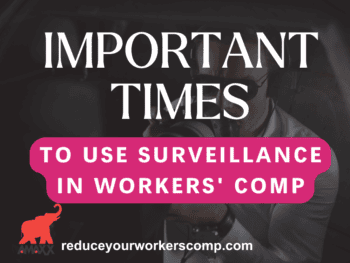This week, a new comp decision came down from the courts (Brown v. B&W Elec. Contr., Inc.) which disqualified a worker for all future wage loss payments for concealing off-the books work activity. The decision has valuable lessons for employers.
Worker Caught Fraudulently Collecting Comp for 13 Years
The worker had been receiving comp for 13 years. He had been declared permanently disabled years before. The first lesson is that it’s nerve too late to gain something from proper investigation.
Surprisingly, it is the employer that is the best source of information about concealed work, not an investigator. The second lesson is that employers need to learn how, and when, to gather information and how to communicate it to carriers and/or the Board.
How can an investigation 13 years after the accident help the employer? Answer: it’s never too late to impress upon workers that fraudulent concealment of work activity can have consequences, even if present workers may never have heard of the worker who was caught, and even if it’s too late to save the employer any money.
Catching Fraud Sets Precedent for Employees
The fact that someone, somehow, caught the concealed work and shut down payments 13 years after the accident is impressive enough. Most people think that, after a few years, no one cares or will do much about it. In this case, the loss of comp payments might be significant, but the troubles with IRS could well be catastrophic – another lesson that the present work force should consider.
Employer In Best Position To Learn About Fraud
Actually, an employer is most likely to be in the best position to learn about fraudulent activity. Former employees with an anti-social disposition frequently brag to former co-workers about their fraudulent activities. Stupid, to be sure, but common. The co-workers and supervisors, however, don’t often volunteer to forward the information to the employer – they fear the consequences of being labeled a snitch.
However, an employer can make discreet inquiries of the supervisors as to what , if anything, a former employee might be doing.
But, and this is most important, NEVER name the source of information or call them to testify. Just pass on the information to a carrier’s investigators – without disclosing the source. If the information was accurate, the investigator will be in a position to produce results ten to a hundred times greater than a cold assignment.
A source of information, once revealed, will never again become a source, nor will any other co-workers learning of the disclosure.
Author: Attorney Theodore Ronca is a practicing lawyer from Aquebogue, NY. He is a frequent writer and speaker, and has represented employers in the areas of workers’ compensation, Social Security disability, employee disability plans and subrogation for over 30 years. Attorney Ronca can be reached at 631-722-2100. medsearch7@optonline.net
Editor Michael B. Stack, CPA, Director of Operations, Amaxx Risk Solutions, Inc. is an expert in employer communication systems and part of the Amaxx team helping companies reduce their workers compensation costs by 20% to 50%. He is a writer, speaker, and website publisher. www.reduceyourworkerscomp.com. Contact: mstack@reduceyourworkerscomp.com.
©2013 Amaxx Risk Solutions, Inc. All rights reserved under International Copyright Law.

























